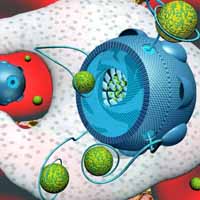Primary immunodeficiency is congenital violations of the immune system that develop due to genetic disorders. Forms of primary immunodeficiency are the insufficiency of the system of complement, phagocytosis, as well as humoral and cellular immunity.
Content
Concept of primary immunodeficiency
Primary immunodeficiency is congenital impairment of the immune system associated with genetic defects of one or more components of the immune system, namely, complement, phagocytosis, humoral and cellular immunity. A common feature of all types of primary immunodeficiency is the presence of chronic infections affecting various organs and tissues and, as a rule, caused by the opportunistic microflora. Opportunist infections are a large group of a variety of infectious diseases. It combines them that they occur only with a pronounced decrease in immunity. In a healthy person or person with a good state of immunity, these diseases, as a rule, do not occur or proceed in lightly.
According to this classification, primary immunodeficies are divided into 5 groups:
- Insufficiency of humoral immunity
- Insufficiency of cellular immunity
- Combined Insufficiency of Humoral and Cell Immunity
- Foocyte deficiency
- Failure to complement
The basis of the modern classification of primary immunodeficiency is the preferential defeat of one or another immunity level.
Fogocytosis deficiency
Fagocite deficiency is 10-15% of all primary immunodeficiency. Phagocyte deficiency is due to impaired proliferation (growth), differentiation, chemotaxis (cellular cell reaction in response to the effect of chemicals) neutrophils and macrophages - cells of actively involved in phagocytosis, and actually violating the phagocytosis process.
Phagocytic cells (cells participating in phagocytosis) are represented by leukocytes and cells of macrophages perform an important role in the protection of the body against glotionic bacteria and other intracellular microorganisms. The pronounced insufficiency of polymorphous leukocytes (neutropenia - a decrease in the number of neutrophils in the general blood test) can lead to the development of a massive bacterial infection.
Of particular importance are two genetic defects that disturb the function of phagocytes, with which the occurrence of severe diseases is associated, often with death - chronic granulomatosis (the cause of which consists in violation of the oxygen reduction mechanism) and the lack of adhesion (adhesion) of leukocytes (due to defects of genes).
Insufficiency of the Complement system
 The failure of the complement system is no more than 2% of all primary immunodeficiency, is manifested by a disorder of the OPSonization (process of interaction with bacteria), phagocytosis (the process of capturing and digesting microorganisms) and the destruction of microorganisms and is accompanied by severe infections, up to the development of sepsis. Complement deficiency is often observed in autoimmune diseases, for example, with a systemic red loll.
The failure of the complement system is no more than 2% of all primary immunodeficiency, is manifested by a disorder of the OPSonization (process of interaction with bacteria), phagocytosis (the process of capturing and digesting microorganisms) and the destruction of microorganisms and is accompanied by severe infections, up to the development of sepsis. Complement deficiency is often observed in autoimmune diseases, for example, with a systemic red loll.
The deficiency of the components of the classical path of the complement activation causes a predisposition to diseases due to disorders in the formation of immune complexes, for example, to the emergence of systemic red lupus. Complement deficit leads to an increase in the body's sensitivity to purulent infections. Insufficiency of the terminal components of the complement system, as well as components of an alternative path, creates a special predisposition to infections - gonorrhea and meningitis. This clearly indicates an important role of an alternative way to activate the complement and the destroying membrane of the complex in the process of removing the bacteria of the specified species.
The most severe disorders of the complement functions associated with the insufficiency of the components of the complement system, which leads to a hereditary angioity edema (an allergic reaction, accompanied by an edema of the mucous membrane of the oral cavity and upper respiratory tract); The disease is transmitted as an autosomal dominant sign. The complement system inhibitor blocks not only the classic integration path of the complement, but also suppresses the activity of the blood coagulation system elements. Basically, the form of insufficiency of components of the complement is inherited as autosomal-recessive signs.









